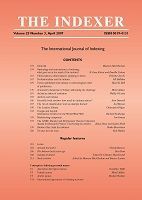
Society of Indexers
@indexers.bsky.social
The professional body for indexers in the United Kingdom and Ireland. We can help you find an indexer, learn about indexing and train as an indexer. Learn more at https://www.indexers.org.uk/
There's lots to say about this complex theme so we'll come back to it at a future meeting. In December we're returning to the theme of the history of media. Thanks as ever to Ann Hudson for facilitating these excellent sessions, and to the SI members who shared their experiences and expertise.
November 5, 2025 at 1:15 PM
There's lots to say about this complex theme so we'll come back to it at a future meeting. In December we're returning to the theme of the history of media. Thanks as ever to Ann Hudson for facilitating these excellent sessions, and to the SI members who shared their experiences and expertise.
As Barbara Hird commented, the important thing is that your index terms should be likely to be searched for, represent the text fairly, and be durable - language changes but we want our indexes to be useful for many years.
November 5, 2025 at 1:15 PM
As Barbara Hird commented, the important thing is that your index terms should be likely to be searched for, represent the text fairly, and be durable - language changes but we want our indexes to be useful for many years.
Our blog post from #IndexDay this year has more on this topic: buff.ly/jdhVfc4

The politics of indexing
Indexers strive for equity and objectivity in their work, but indexes – like all other texts – have political implications. For our National Indexing Day blog,
www.indexers.org.uk
November 5, 2025 at 1:15 PM
Our blog post from #IndexDay this year has more on this topic: buff.ly/jdhVfc4
Another good resource for this topic is Christine Jacob's Indexer article 'Ethical places, ethical spaces: stopping to listen' (Vol 25, No 3, 2007) buff.ly/OSu2xYz

November 5, 2025 at 1:15 PM
Another good resource for this topic is Christine Jacob's Indexer article 'Ethical places, ethical spaces: stopping to listen' (Vol 25, No 3, 2007) buff.ly/OSu2xYz
We also talked about the very notion of preferred and non-preferred terms introducing a hierarchy, and whether there were better ways to describe this distinction. The Getty Research Institute Vocabularies (buff.ly/UonvxC4) can be a good place to start when thinking about preferred terminology.
November 5, 2025 at 1:15 PM
We also talked about the very notion of preferred and non-preferred terms introducing a hierarchy, and whether there were better ways to describe this distinction. The Getty Research Institute Vocabularies (buff.ly/UonvxC4) can be a good place to start when thinking about preferred terminology.
A useful piece of good practice shared is to flag headings for review when you've worded them yourself, rather than used terms included in the text; then you can consider later whether you have introduced any bias.
November 5, 2025 at 1:15 PM
A useful piece of good practice shared is to flag headings for review when you've worded them yourself, rather than used terms included in the text; then you can consider later whether you have introduced any bias.
Inclusion in indexing is another area where bias and neutrality need to be considered. Marginalised people have been historically excluded from indexes. Whether they are indexable depends on the text and its likely readers, and is influenced by the space available for the index.
November 5, 2025 at 1:15 PM
Inclusion in indexing is another area where bias and neutrality need to be considered. Marginalised people have been historically excluded from indexes. Whether they are indexable depends on the text and its likely readers, and is influenced by the space available for the index.
We also discussed including emotional flavour in index terms, especially for biographical works. Should we include this or do we make more neutral headings that efface this? Could including it cause the index to "usurp the function of the text itself", as indexer Douglas Matthews suggested?
November 5, 2025 at 1:15 PM
We also discussed including emotional flavour in index terms, especially for biographical works. Should we include this or do we make more neutral headings that efface this? Could including it cause the index to "usurp the function of the text itself", as indexer Douglas Matthews suggested?
Similarly, changing vocabularies around gender and sexuality can need careful handling.
November 5, 2025 at 1:15 PM
Similarly, changing vocabularies around gender and sexuality can need careful handling.
We talked about changes to terminology, especially in sensitive areas. In history writing now 'enslavement' is often used in preference to 'slavery'; however, indexers may still include a cross-reference from 'slavery' which remains a likely sought term.
November 5, 2025 at 1:15 PM
We talked about changes to terminology, especially in sensitive areas. In history writing now 'enslavement' is often used in preference to 'slavery'; however, indexers may still include a cross-reference from 'slavery' which remains a likely sought term.
Aspects of bias in indexing include wording of entries; inclusion/exclusion of terms and concepts; how we recognise our own bias; and how we work on texts or with authors we disagree with.
November 5, 2025 at 1:15 PM
Aspects of bias in indexing include wording of entries; inclusion/exclusion of terms and concepts; how we recognise our own bias; and how we work on texts or with authors we disagree with.
Thanks as always to Ruth Martin for facilitating this, and to all our conference presenters and participants.
October 16, 2025 at 12:14 PM
Thanks as always to Ruth Martin for facilitating this, and to all our conference presenters and participants.
For people wanting to dip a toe in the water, it's worth thinking about offering a short Lightning Talk - these are a feature of most of our conferences, can be on any topic, and are a good way to try out presenting without committing to a full conference session.
October 16, 2025 at 12:14 PM
For people wanting to dip a toe in the water, it's worth thinking about offering a short Lightning Talk - these are a feature of most of our conferences, can be on any topic, and are a good way to try out presenting without committing to a full conference session.
Conference feedback was enthusiastic, especially for participatory sessions. As conference presenter Alan Rutter suggested, running a conference session is a liberating experience that's really worthwhile in terms of your own learning and development, and your relationship with your fellow indexers.
October 16, 2025 at 12:14 PM
Conference feedback was enthusiastic, especially for participatory sessions. As conference presenter Alan Rutter suggested, running a conference session is a liberating experience that's really worthwhile in terms of your own learning and development, and your relationship with your fellow indexers.

